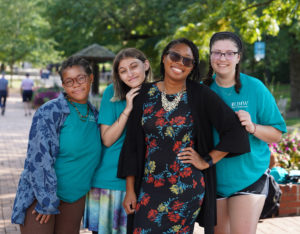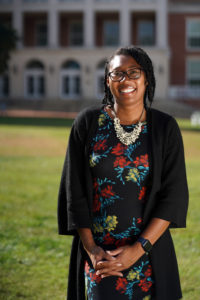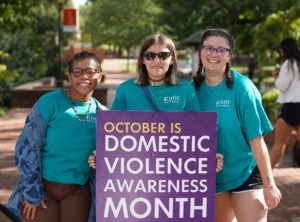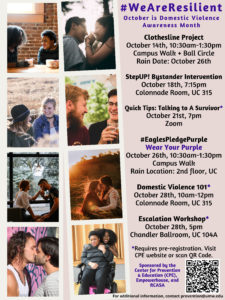Marissa Miller wants University of Mary Washington students to know that when they disclose incidents of sexual assault, intimate partner violence and stalking, they will be heard and supported.

“Many assume they’ll have to come in and share their story,” said Miller, who recently became the director of UMW’s Center for Prevention and Education, or CPE. That’s not required, she said, “but we want students to know they have lots of options and that we’re here to help them feel empowered with whatever decisions they make.”
With her new and vital position at Mary Washington, Miller stands as the first line of support and resources, offering direct services to students who experience sex- and gender-based violence. Her office will also oversee the continuation of a $300,000 grant, awarded by the Justice Department’s Office on Violence Against Women (OVW), which will help expand CPE’s services and offer more programming focused on prevention, awareness and education, intervention and advocacy. UMW is among 52 institutions of higher education selected to receive these federal funds, which come as the University observes Domestic Violence Awareness Month in October.

“So much changed in higher education after campuses began viewing sex- and gender-based violence as discriminatory acts under Title IX,” said Vice President of Student Affairs Juliette Landphair. “This competitive grant allows Mary Washington to build on UMW’s resource-and-response scaffolding built by faculty and staff members committed to removing barriers to a full and thriving college experience for students. I am thrilled that Marissa will be leading this work; she is especially trusted and respected by students.”
Mary Washington’s first OVW grant, awarded in 2016, established the Center, which helps students navigate resources, including seeking counseling services and medical care, and working with Title IX to arrange academic and housing accommodations. CPE staff can also help survivors who wish to file a report with law enforcement or connect them with community partners like Empowerhouse, a local domestic violence agency, and Rappahannock Council Against Sexual Assault (RCASA).
With the renewed grant, Miller hopes to grow the TEAL Peer Educator program, citing data showing that those who experience sexual assault are most comfortable confiding in their fellow students. TEAL educators undergo certified training to provide confidential, peer-to-peer support to survivors, and can work with classes, residence halls, athletic teams and campus organizations on student-centered programming.

“I became a TEAL Peer Educator to help other students,” said senior Kayla Botto, who joined the program in 2019. “I never want anyone to feel like they have to suffer alone or that no one cares.”
The Center also plans to hire a full-time project director – a stipulation of the OVW grant – to assist with coordinating programs, from the kNOw MORE Resource Fair at the start of each academic year to regular Coffee and Consent events. Other signature programs include Sexual Assault Awareness Month in April and February’s One Love, promoting healthy dating relationships.
In her new role, Miller plans to continue strengthening ties with faculty, staff, students and community partners who make up UMW’s Coordinated Community Response Team, created through the original grant. The group’s work has led to increased prevention and educational programs, especially for marginalized students; workshops on consent and bystander intervention; and more communication between on- and off-campus partners.
 In addition, a law enforcement subcommittee, headed by UMW Police Lt. Bill Gill, has provided training for University and Fredericksburg officers, specifically focused on LGBTQ+ students, report-writing, de-escalation and crisis intervention. The University also hosted a multidisciplinary conference on best practices to address gender-based violence on college campuses, organized by the student conduct subcommittee, co-chaired by Title IX Coordinator Stefanie Lucas-Waverly and James Farmer Multicultural Center Associate Director JoAnna Raucci. The victim services subcommittee, co-chaired by Empowerhouse and RCASA, created You Are Not Alone, a comprehensive resource guide for students.
In addition, a law enforcement subcommittee, headed by UMW Police Lt. Bill Gill, has provided training for University and Fredericksburg officers, specifically focused on LGBTQ+ students, report-writing, de-escalation and crisis intervention. The University also hosted a multidisciplinary conference on best practices to address gender-based violence on college campuses, organized by the student conduct subcommittee, co-chaired by Title IX Coordinator Stefanie Lucas-Waverly and James Farmer Multicultural Center Associate Director JoAnna Raucci. The victim services subcommittee, co-chaired by Empowerhouse and RCASA, created You Are Not Alone, a comprehensive resource guide for students.
“This kind of work definitely takes a village,” Miller said. “It cannot be done by one office alone, so it’s important for us to engage our partners and allies so we can better support survivors.”
Learn more about the Center for Prevention and Education and October’s Domestic Violence Awareness Month events at UMW.